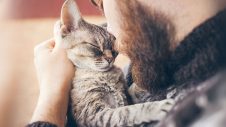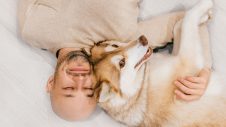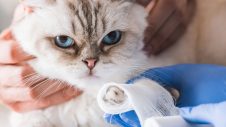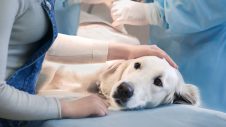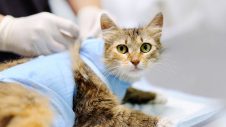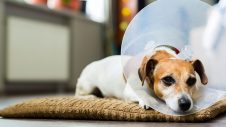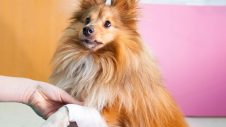 My dog needs surgery and I’m worried
My dog needs surgery and I’m worried
Preparing your dog for surgery can be a worrying time for any pet parent. Whether your dog is being admitted for a routine surgical procedure or a more complex dog surgery, it is a natural emotion for any pet parent to feel anxious.
You may be worried about your dog experiencing pain or fear surrounding their surgical procedure. Rest assured, your local Greencross Vets team will monitor your dog before, during, and after surgery, ensuring their comfort and safety during their stay with us.
Fluid therapy
It is advised that every pet undergoing a general anaesthetic and surgical procedure at Greencross Vets is given intravenous fluids. This will help maintain your pet’s blood pressure during the procedure and support vital organ function. This means a safer anaesthetic and a smoother recovery.
Pain relief
Good pain relief is crucial to the physical and mental recovery of your pet from surgical procedures. It is provided to all pets following a surgical procedure. In most cases, we will also provide take-home medication so your pet can continue to recover comfortably at home.
Tailored anaesthesia
Before surgery, your veterinarian will tailor an individual anaesthetic program for your pet, based on their age, breed, and current health status. We also use specialised equipment to monitor your pet during surgery.
Before and after surgery monitoring
The Greencross Vets dedicated nursing team will monitor your pet’s surgery before, during and after the procedure. You can have peace of mind that your pet is under the watchful eye of caring professionals.
What to do the day before surgery
The most important thing to remember is to restrict your pet from eating after 8:00 pm the night before their surgery is scheduled. You can leave their water bowl out until early the next morning, at which time you will need to remove it.
Bathing
Your pet will not be able to have a bath for at least 10 days after sterile surgery, so if your pet requires bathing we recommend that it be done prior to the day of surgery.
Up-to-date vaccinations
For the protection of all patients, we encourage that all visiting pets be up-to-date with their vaccinations.
Time to microchip
Microchipping is a non-invasive, safe way of identifying your pet for life should they become lost. This can easily be done at the time of surgery so if you haven’t already, now is a great time to consider microchipping.
About anaesthetics
As in human medicine, the anaesthetics available for companion pets are extremely safe. Unlike humans, pets cannot always tell us when they feel unwell. Due to their natural instinct to protect themselves, they often hide their illness.
To better assess your pet’s overall health and ensure there are no underlying problems, it is necessary to perform a blood test prior to anaesthesia. This is a laboratory test that examines your pet’s major organs such as the ability of the liver and kidney to rid the body of drugs and medications. It also identifies abnormalities in blood cells such as the ability to carry oxygen and fight infection and clots.
If the test results are normal, we can proceed with confidence. If results reveal underlying issues, we may alter the anaesthetic procedure or in some cases, postpone the procedure in order to monitor and treat your pet first.
Arriving at the vet clinic
When you first arrive at the clinic we will ask you to complete an admission form which includes contact phone numbers as well as relevant information about your pet. If your pet has recently been unwell we request that you share this information with us.
Depending on the type of surgery being undertaken, you may also need to see one of our veterinarians to review information about your pet’s health. If you think your pet may lick or chew at their wound, it is a good time to discuss this with our nurses. We may recommend an Elizabethan collar to stop your pet from licking or biting their wound.
Your pet’s day
Once your pet has been admitted, we will perform a health check-up and administer a sedative to help your pet relax. Just like us, they too get anxious prior to surgery. An anaesthetic agent will be administered and an attending veterinary nurse will constantly monitor your pet’s vital signs right through to recovery. It will be necessary to clip your pet’s hair around the surgery area for optimum surgical conditions. After the surgery, your pet will recover on a hygienic, warm and fluffy bed. We treat your pets as if they are our own. Our veterinary nurse will continue to monitor recovery and give your pet the attention (and cuddles) they deserve.
Your day
We are often asked whether or not a pet parent should stay at home to care for a pet after surgery. Generally, pets make a speedy recovery after routine procedures, so staying at home with them is not necessary (as long as they have somewhere warm, comfortable, and clean to rest). However, if you are considering making special plans to be with your pet, we suggest you take the day off after surgery rather than the day of surgery.
Picking up your pet
Our team will explain how to take care of your friend at home and provide you with information on caring for your pet after surgery.
Our team understands and values the bond between you and your pet and are committed to providing the best in veterinary medicine. For this reason, we adhere to the highest standard of care, so your pet receives optimal treatment.
You can have peace of mind that when your dog is in our care for surgery and recovery they are treated as if they are one of our very own.
If you have any questions in the lead up to your dog being admitted for surgery, contact your local Greencross Vets team. We’d be happy to provide you with more information about your dog’s surgery and what the day will entail.

 Greencross Vets
Greencross Vets 